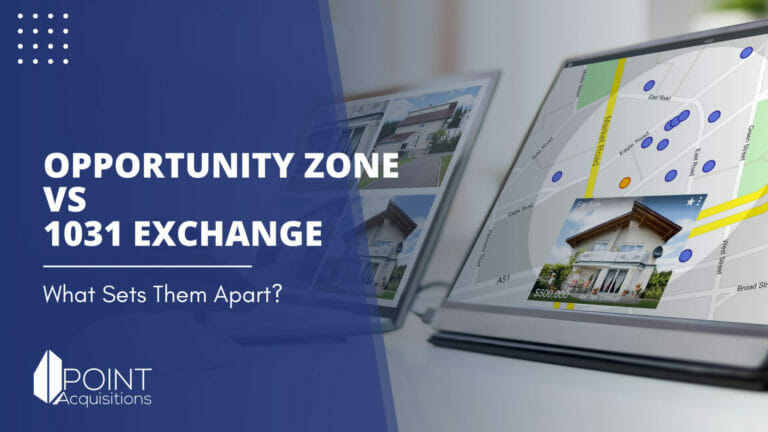
What’s the Difference Between an Opportunity Zone Vs 1031 Exchange?
Investors have looked to 1031 Exchanges to defer their capital gain taxes for years. However, today we can look deeper into opportunity zone vs 1031 exchange and find unique opportunities in Opportunity Zones that also prove hugely beneficial for those considering investing through the traditional route.
This article will cover how taking advantage of investing in Opportunity Zones may open up more options than ever – including key differences you should be aware of first! Understanding taxes on commercial real estate sales can open many doors!

Table of Contents
How do Opportunity Zone funds work?
An Opportunity Zone is an economically-distressed community where new investments, under certain conditions, may be eligible for tax benefits. Local governments get to nominate which census tracts will receive this designation.
To encourage investment in these areas, the Tax Cuts and Jobs Act created a new type of investment vehicle called an Opportunity Fund. Investors can pool their money into these Funds, which are then used to finance projects within Opportunity Zones.
In exchange for investing in these areas, investors can enjoy several benefits. These benefits include deferred capital gains tax on any profits from the sale of their investment. A possible reduction in taxes on those profits if the investment is held for at least five years.
Opportunity Zone investment aims to revitalize communities and spur economic development by providing incentives for private investment in areas that need it the most.
Benefits of a Qualified Opportunity Zone?
The benefits of investing in a Qualified Opportunity Zone are numerous. Most importantly, investors can receive significant tax benefits when they reinvest their capital gains into an Opportunity Fund.
In addition, there is the potential for double or even triple tax-free growth if the investment is held for at least ten years. And because the investments are made in designated economically-distressed communities, there is also the potential to do good while earning a return on investment.
Given all of these factors, it’s no wonder that many savvy investors are eager to take advantage of this unique opportunity for economic growth.
What are 1031 Exchanges?
On the other hand, a 1031 Exchange is a tax-deferral tool that can also be used to invest in real estate. It allows investors to defer paying capital gains taxes on a property sale by reinvesting their proceeds into another like-kind property of equal or greater value up to 200% (also known as 200% exchange rule).
For an exchange to qualify as 1031, certain criteria must be met. These requirements include using an intermediary to handle the funds, a 45-day window for identifying potential replacement properties, and 180 days for closing the new purchase.
Furthermore, any capital gains taxes accrued will eventually have to be paid – although the tax can often be deferred, depending on the nature of the exchange.

Benefits of a 1031 Exchange
The primary benefit of a 1031 Exchange is the ability to defer capital gains taxes for an extended period. This can be especially advantageous for those who wish to grow their property portfolio. Reinvesting the proceeds into similar properties can help them increase their wealth without paying additional taxes in the shorter term.
In addition, a 1031 Exchange allows investors to leverage their capital gains to acquire bigger and better properties, potentially resulting in higher rental income or improved resale value.
Opportunity zone vs 1031 exchange: How to choose the right one for you
When it comes to deferring capital gains tax, there are several options available to you. Two of the most popular are Opportunity Zones and 1031 Exchanges. But how do you know which one is right for you?
The best way to choose between an Opportunity Zone and a 1031 Exchange is to consult a qualified professional. They will be able to help you assess your goals and risk tolerance and make the best decision for your situation. The 1031 exchange vs opportunity zone does not need to be a battleground, do your research and ask the experts when in doubt!
Key Takeaways
Before investing, it is essential to consider your plans for the future. Additionally, 1031 Exchanges and Qualified Opportunity Zones each have advantages and disadvantages that should be considered.
The opportunity zone 1031 exchange debate will likely continue to rage on. At Point Acquisitions, we are here to help you every step of the way. We will provide a comprehensive analysis of your investment goals and advise on the best course of action so that you can make an informed decision when choosing between an Opportunity Zone or 1031 Exchange.
Contact us today to get started!
About The Author

Jesse Shemesh
Disclaimer
Please note that Point Acquisitions is not a tax expert or tax advisor. The information on our blogs and pages is for general informational purposes only and should not be relied upon as legal, tax, or accounting advice. Any information provided does not constitute professional advice or create an attorney-client or any other professional relationship. We recommend that you consult with your tax advisor or seek professional advice before making any decisions based on the information provided on our blogs and pages. Point Acquisitions is not responsible for any actions taken based on the information provided on our blogs and pages.
1031 Exchange Capital Gains Tax Deferral
According to a 2021 report by the National Real Estate Exchange Services (RES), over 240,000 1031 exchange transactions were completed in the United States, totaling $100 billion. This impressive figure underscores the role of 1031 exchanges in the real estate…
Read More1031 Exchange Benefits
As of Q4 2023, the national vacancy rate for all commercial property types in the United States sat at 9.2%, according to CBRE’s latest insights and research. This represents a slight decrease compared to the previous quarter and suggests a…
Read MoreUnderstanding Commercial Property Value
The art of commercial real estate valuation is a critical skill in an industry teeming with over $1 trillion in yearly transactions. Our detailed guide on how to value commercial property is designed to elevate your expertise and give you…
Read More

